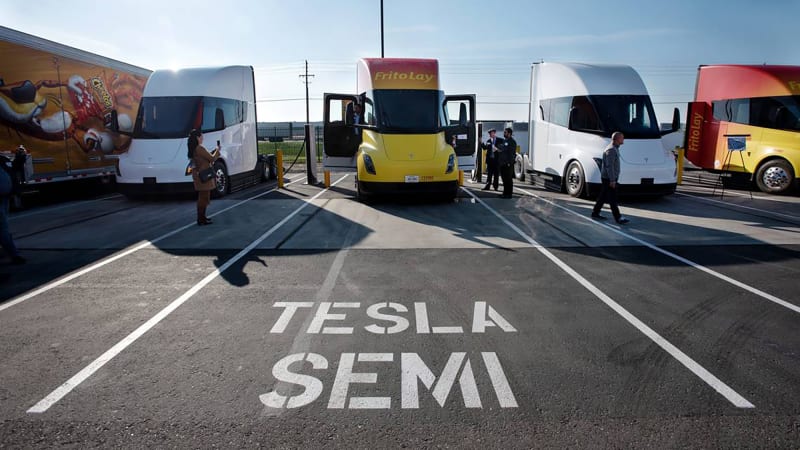Tesla Semi skepticism lingers months after Musk’s first delivery

Elon Musk has long relished trolling those who’ve doubted him and Tesla.
In 2018, he vowed to send “short shorts” to hedge fund manager David Einhorn, who’d been betting against Tesla’s stock. A couple years later, the company actually listed satin trunks as a gag gift for sale on its website.
Musk heard “various forms of ‘you’re a fraud,’” he told the crowd at Tesla’s Model Y unveiling in 2019. His defiant retort: “You can drive that fraud!”
The Tesla chief executive officer’s latest reveling had to do with the Semi, the heavy-duty truck that took five years to go from prototype to production. “Some people have said this was impossible,” Musk said during a Semi manufacturing event in Nevada last month. “But, uh, you can drive it.”
The reasons for this proverbial victory lap were clear. Weeks earlier, Tesla handed off its first Semis to PepsiCo, which took delivery of 15 of the big rigs for its massive Frito-Lay facility in Modesto, California. The purpose of the late January event in Nevada was to announce a $3.6 billion investment to expand the use of Tesla’s existing factory near Reno to build more battery cells, as well as Semi trucks.
While those were causes for celebration — something Musk can afford to do again, the way Tesla shares have soared this year — there’s still a lot of uncertainty as to just how meaningful the Semi will be to Tesla’s business. I had a lot of questions for the company when I drove out to Modesto to see the trucks in person last month. While I was able to climb into the Semi’s spacious cab and its centered driver’s seat, test drives were off limits.
Tesla staffers on site didn’t comment. PepsiCo representatives confirmed they’d taken delivery of all 15 trucks ordered as part of a $30.8 million project I wrote about in November — the one for which California’s Air Resources Board picked up half the check — but had little else to share about the product.
It remains unclear how much the Semi costs, or whether any other customers who ordered trucks from Tesla a half decade ago have managed to get their hands on them. Tesla didn’t mention the model in its quarterly production and deliveries release last month, then referred to the Semi being in pilot production in its earnings deck. While Musk offered an update during the earnings call on when he expects Tesla to be making Cybertrucks in volume — not until next year — he didn’t have anything to say about the Semi.
Sightings of Semis on the side of the road in Sacramento and getting towed from a Nevada highway have lit up the message boards and social media networks where pro- and anti-Tesla flame wars have been fought for years.
Even before those incidents, there were still vestiges of doubt about the Semi that Musk had yet to vanquish. Analysts at RBC Capital Markets who have the equivalent of a buy rating on Tesla stock cautioned in December that the CEO may be getting ahead of himself in aiming to make 50,000 trucks in 2024. RBC was modeling for more like 4,000.
This much is for certain: there’s an urgent need for Tesla and other manufacturers to electrify big trucks. The city of Modesto has long struggled with poor air quality and high asthma rates. PepsiCo’s Frito-Lay facility spans 500,000 square feet, and the food giant’s ambition is for it to be a showcase in sustainable manufacturing, warehousing and distribution.
We should hear more about how Tesla plans to help companies like PepsiCo and cities beyond Modesto decarbonize on March 1. Musk has said the master plan he’ll deliver will chart “the path to a fully sustainable energy future for Earth.”







